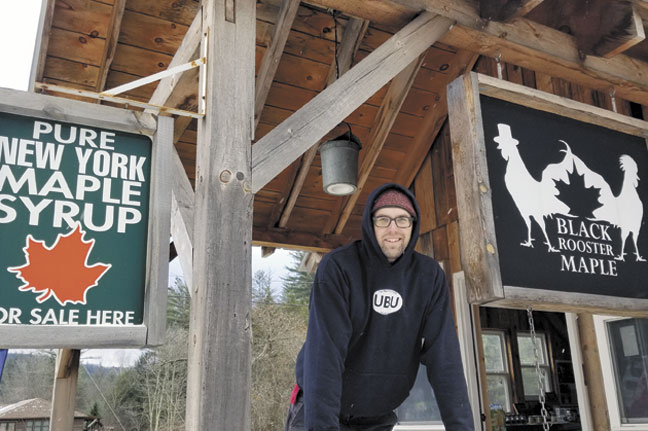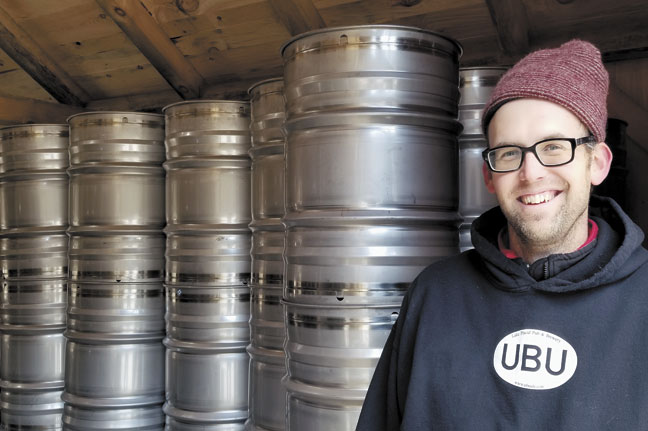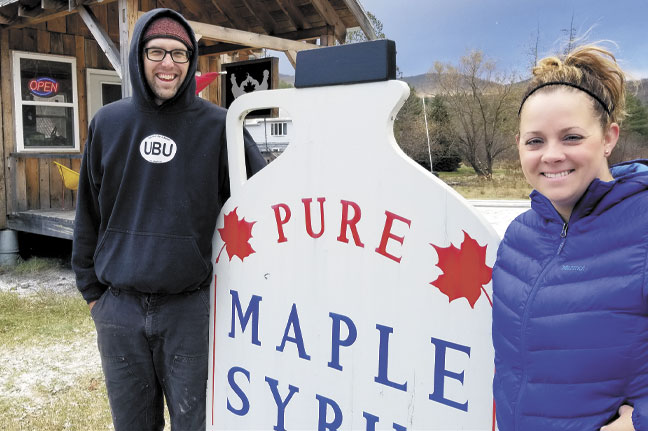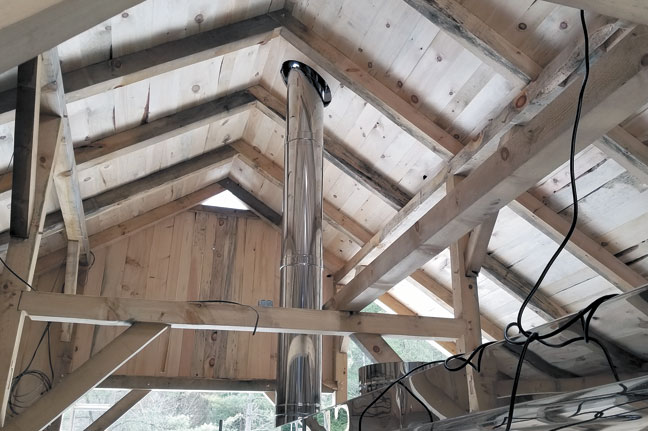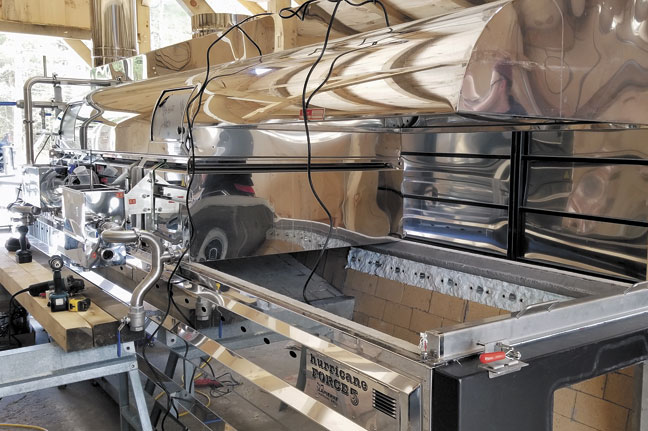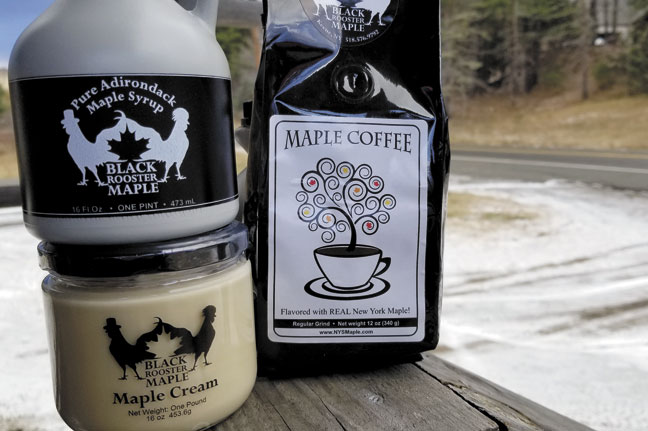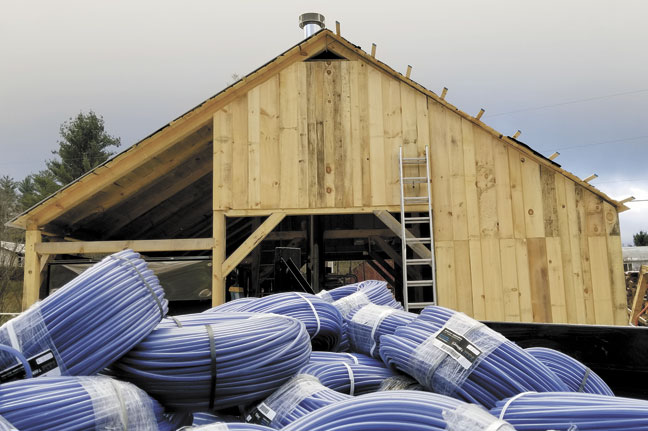Sugarmaker Profiles
Crazy about maple: From engineer to full-time sap boiler
New Yorker quits his job to dive into sugaring fulltime
By PAUL POST | FEB. 1, 2018
Kirk Bassarab readily admits he’s crazy about maple.
Why else would he give up a well-paying, secure job with benefits to go full-time into sugaring?
Bassarab and his wife, Kristy, own Black Rooster Maple in Keene, N.Y., on busy state Route 73, the main travel corridor for people headed to Lake Placid, the “Olympic Village,” which attracts countless visitors throughout the year.
They are just now putting finishing touches on a brand-new sugarhouse in preparation for the 2018 season.
“We made the decision that could only make sense in the maple sugaring world,” Kirk said. “I quit my job as an engineer with New York State to be a full-time sap boiler. The decision was not entirely easy to make. Most sane people would not make the same. We are passionate about our business, still young enough to give it a go, and have a very good established market that has been growing significantly the last few years.
Booming demand for their sweet-tasting products proved to be the tipping point behind their decision to become full-time maple entrepreneurs.
“We’ve seen this business grow from literally zero to a hopefully viable business that can support our family,” Kirk said. “From our original 12 taps, we quickly expanded to 500, then 1,000. We are undergoing a big project to get to 4,000 for the upcoming season.”
Last spring, Black Rooster was operating with a Lapierre Junior RO and 2.5-foot by 10-foot Leader Vortex evaporator, in a cramped 12-foot by 16-foot sugarhouse. In June, the Bassarabs were awarded a New York State New Farmers Grant, to help fund their current expansion.
“We’ve upgraded equipment to a 1,200 gallons-per-hour Lapierre RO, a 4-foot by 14-foot Lapierre Force 5 evaporator, and a new 28-foot by 36-foot timberframe sugarhouse,” Kirk said. “All will be operational by the 2018 sugar season.”
The sugarhouse is a traditional mortise-and-tenon timber frame that he designed and cut. The frame was erected by friends and family at a traditional-barn raising party in mid-October. “The entire frame and all the pine sheathing was salvaged from logs that a local tree service was looking to discard,” Kirk said. “The total project costs are significant due to the equipment upgrades. However, I’ve only got about $5,000 to $6,000 out-of-pocket in the sugarhouse thanks to the free pine logs, and my sweat equity in construction.”
All of this has happened in the space of nine years.
Kirk and Kristy are both from Warrensburg, N.Y., and moved to Keene -- home of the Adirondack High Peaks -- in 2005. He has a bachelor’s degree in civil engineering from Union College, in Schenectady, and obtained his professional engineer license in 2008.
Previously, Kirk worked for a private consulting engineering firm as a junior engineer, the Town of Keene as water superintendent, Essex County Department of Public Works as deputy superintendent, and more recently with the state Department of Environmental Conservation as an environmental engineer.
Kristy attended North Country Community College and held licenses in massage therapy and esthetics.
“We started maple sugaring in 2008 on less than half an acre at our first house in Keene,” Kirk said. “For the first several years living there, I pondered the few maples we had and was curious what it took to make maple syrup. After doing a bit of research and picking up the book, KBackyard Sugarin’, we hung 12 buckets and boiled on a 2-foot by 4-foot flat pan set on cinder blocks with an open fire underneath. We made three gallons our first year.”
Black Rooster Maple opened for business in 2011. The name was inspired by a rooster the Bassarabs owned, called “Black,” who watched over a flock of Rhode Island red hens, which would pluck at the tuft of white feathers on his head. To protect Black’s noggin, Kirk and Kristy gave him a small duct tape top hat. So Black Rooster Maple’s handsome logo shows two images of Black facing each other, one with and the other without his top hat.
“Our goals are to continue growth of the business on all fronts,” Kirk said. “Our current gross is about 75 percent retail and 25 percent wholesale. We have only sold in retail containers and until recently the largest container we’ve ever sold is a gallon. However, we’ve picked up a restaurant account that will be purchasing five-gallon containers from us. We sell at farmers markets and festivals as well as our retail shop and wholesale accounts.”
Kristy, too, set aside her professional career to help run black rooster maple. “She’s half stay-at-home mom, watching our daughter, Ryleigh, and half confection queen,” Kirk said. Like most producers, a big share of their business comes from value-added items such as maple cream, sugar pieces, and barrel-aged maple syrup.
“We have friends and neighbors at Gristmill Distillers just around the corner from us in Keene and we’ve obtained a significant number of used spirits barrels from them,” Kirk said. “We’ve done apple brandy, rye whiskey, bourbon, and maple whiskey barrel-aged syrups. The maple whiskey-aged syrup is the fourth use of an individual barrel, having started life as a bourbon at the distillery, coming to us for a bourbon syrup, returned to Gristmill for a maple whiskey, then back to us for the fourth use as a maple whiskey barrel-aged maple syrup.”
For six years, Kirk and Kristy ran Black Rooster Maple as a part-time, side business. In 2012, they built and opened a timberframe storefront on well-traveled Route 73, which sparked a major uptick in retail sales.
By last year, they realized it was simply too difficult for Kirk to hold down a full-time job while managing a thriving sugaring business. So, with careful planning and hard work, they took a leap of faith to blaze a new career path.
“The fact that I have a significant education and job experience made it much easier to make this decision,” Kirk said. “If things don’t quite work out as planned, I’ll go get a job.”
But, given the couple’s infectious enthusiasm for maple, and an excellent business location en route to a world-class tourist destination, it’s doubtful he’ll ever have to. After all, both Kirk and Kristy are mad about maple.
“We have the maple sickness,” he said, smiling.















